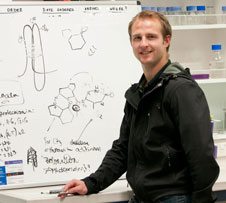
Aaron Stevens
“The field of genetics is advancing rapidly and still has many questions remaining to be answered.'' This is one of the reasons Aaron Stevens is excited to be undertaking his PhD at the University of Otago, Christchurch, in the Gene Structure and Function Lab. Another is being supervised by renowned geneticist, Professor Martin Kennedy.
Scientists from the United Kingdom's Cambridge University recently announced they had found evidence of quadruplex structures in the genome of living human cells. Aaron's research investigates a unique observation made by the Gene Structure and Function Lab, where these structures interfere with standard genetic testing techniques.
DNA in the human genome can be modified by a process called methylation, and some genes are methylated in a way that reflects the parent from which they were inherited. Aaron's project involves studying how DNA methylation can interact with novel DNA structures called 'quadruplexes' which are known to form in certain genomic regions.
“If you think of DNA as a set of train tracks, then the biological machinery which copies the DNA is the train. When the DNA contains abnormal structures these can block the ability of the machinery to progress past them, or similar to a train cause a derailment. My research involves investigating how novel DNA structures can interact with biological machinery, impairing function. More specifically, we have found a region in the human genome where this only occurs on DNA which has originated from your mother and not your father, causing one of the two gene copies to be 'invisible' during genetic testing,'' Aaron says.
He started his tertiary study at Canterbury University doing a Bachelor of Science, endorsed in biosecurity.
“I always wanted to continue in the field of genetics, so I then completed a Postgraduate Diploma in Microbiology. After my fourth year at Canterbury I was fortunate enough to transfer to the University of Otago, Christchurch's Pathology Department. Here I began a thesis-only Masters, in Biochemistry/Genetics; then towards the end of my masters I was able to transfer to a PhD. It has been an exciting journey and I am glad to have a great team to work with every day.''